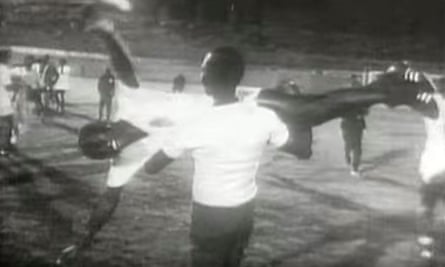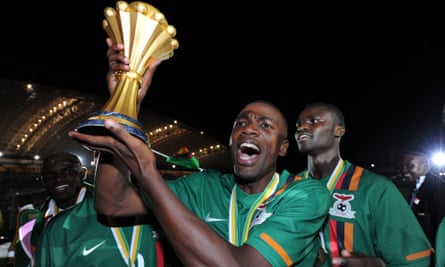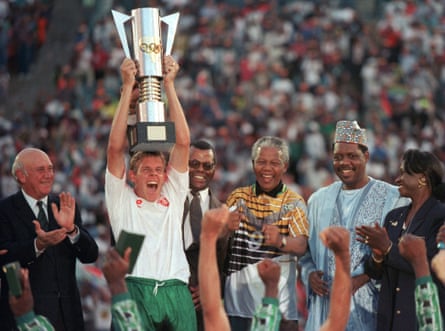1) The time an Englishman became champion of Africa
The Tunisian referee Ali Bin Nasser will never be allowed to forget his role in one of the most galling defeats in English history but, in the name of fair play, we should also recall that only a few months prior to carrying out an impromptu study of Mexican cloud patterns while Diego Maradona punched the ball past Peter Shilton, Bin Nasser presided over a glorious English success. He was the referee who kept a careful eye on the 1986 Africa Cup of Nations final, scrupulously permitting no manual skulduggery as the manager Mike Smith helped Egypt to end a long and painful wait for victory. So let’s call it quits.
Egypt’s Nations Cup history got off to a misleadingly straightforward start. They won the first two editions, when there were barely enough competitors to call it a tournament, and finished runners-up in the next one but then began to struggle despite the country’s club scene flourishing. Indeed, in 1967, in the wake of the humiliating loss in the six-day war, president Gamal Abdel Nasser decided that football was flourishing far too much, distracting the menfolk and sapping their mettle. So he outlawed it. The ban was lifted in 1971, and three years later Egypt hosted the tournament for the first time. They flopped, beaten in the semi-final by a fine Zaire side. Staging the final was painful after that and as if to compound the hosts’ woe Zaire and Zambia drew 2-2 in front of a minuscule crowd, obliging Egypt to stage a replay, which Zaire won 2-0.
So Egypt were a team under serious pressure when they next hosted the tournament, in 1986. At the time there was plenty of money swishing around Egyptian football. Many foreign coaches were lured, such as Don Revie, who won the 1984 African Cup Winners’ Cup with Al Ahly, while Smith was appointed to the national team job a decade after guiding Wales to within a play-off of the 1976 European Championship. Smith helped arrange England’s first ever match in Africa, Bobby Robson’s team winning 4-0 in a friendly in Cairo in January 1986. Two months later the Africa Cup of Nations kicked off in the same city – and Egypt looked set for another chastening flop, as a Jules Bocandé-inspired Senegal upset them 1-0.
But Smith’s side rallied, finishing top of the group thanks to wins over Ivory Coast and Mozambique before edging out Morocco in the semi-final with a goal by Taher Abouzeid, aka “the Maradona of the Nile”. No one scored in the final, which, in stark contrast to the previous one staged in Cairo, was attended by around 100,000 people. Most of those people fell into silence when Cameroon’s Thomas N’Kono saved Mustafa Abdou’s penalty in the shootout. But Thabet El-Batal restored hope by saving from Grégoire M’Bida. And joy erupted when André Kana-Biyik shot wide to give Egypt and Smith victory.
Smith could not repeat that success in 1988, when Egypt slipped out at the group stage, and did not have as deep an influence on Egyptian football as his two most brilliant successors (Mohamed El Gahary and Hassan Shehata) did. But in 1986 he did what was asked of him. And how many other English managers since Sir Alf Ramsey have won an international tournament? And on a penalty shootout, to boot. PD
2) When Red Devils were plucked from a basket
The thinking before the 1972 tournament was that the best that the players of the People’s Republic of Congo could hope for was a creditable performance against their neighbours Zaire, who were the most likely challengers for the title along with the hosts Cameroon and Salif Keita’s Mali. Congo achieved that in their second group match, when they played well but lost 2-0 to the Leopards. But Congo were not content with that and tonked Sudan 4-2 in their final group game, meaning they finished level on points and goal difference with Morocco. A raffle featuring two pieces of paper and a basket was hastily arranged to determine which country would be declared group runners-up. Luck favoured the Red Devils.
Their good fortune was not expected to last, however, as the semi-final pitted them against Cameroon, who had benefited from the sort of luck that hosts often enjoy when they drew their final group game thanks to a goal scored after the Malian defence had stopped in the belief that the ball had gone way out of play. “That’s one the biggest scandals in Africa Cup of Nations history, it was at least five metres out!” thundered the commentator on Malian radio after the Egyptian referee allowed the goal to stand, although Keita, who had watched from the press box because of injury, said afterwards that “it was only out by 1.5 to two metres.”
If that was scandalous, the semi-final was shocking in the best sense. Cameroon, slow and sterile either because of complacency or the weight of expectation, could not make any inroads against zesty and imaginative young underdogs. Congo opened the scoring after half an hour through their rugged and inventive central midfielder Noël “Pépé” Minga and they held out for victory. Congo played with a powerful spirit under manager Adolphe Bibandzoulou and their squad contained some truly nifty players – such as the marauding winger Jonas “Tostao” Mbemba, the striker Jean-Michel “Sorcerer” M’Bono of Étoile du Congo and a 21-year-old Paul Moukila, who began to show at this tournament the sort of form that would later make him an African player of the year. Congo’s best foreign-based player was the Ajaccio midfielder François M’Pélé, later of Paris Saint-Germain. All very well, but Mali had Keita, the 1970 African footballer of the year and a regular destroyer of European defences with St Etienne.
Injury forced Keita out of the final after 21 minutes but Moussa Diakhité soon helped prove that Mali still had plenty of other fine players: before half-time he feinted his way past an opponent and lashed a left-foot into the top corner from 25 yards. But Congo upset the odds and overturned the score when M’Bono struck twice in two minutes just before the hour, the second goal a superb flip with the outside of his boot from the edge of the area. M’Bono then teed up a third for M’Pélé. Moussa Traoré pulled one back for Mali but Congo held on to deliver and to become the most surprising champions in the tournament’s history. PD

3) When a penalty shootout became an endurance event
Any player who scores in a shootout would surely admit to a secret rush of relief – a realisation that whatever comes next, they have escaped personal culpability. They would do well to heed the tale of Ghana’s Anthony Baffoe, who suffered the exquisite heartache of scoring, exhaling, then being summoned again, with the stakes raised tenfold, and missing.
In 1992, after a run of victories for teams outside the region, west Africa regained continental supremacy in Dakar, Africa’s westernmost city. Four-time champions and favourites Ghana, led by Abedi Pele, faced their neighbours Ivory Coast, whose tough homegrown defence had carried them to the final without conceding a goal.
Ahead of the semi-final with Cameroon, the Ivory Coast coach, Yeo Martial, had been pragmatic about how they would set up. “In the past we’ve played entertaining football, but have returned home without the cup,” Martial told John Salako in Channel Four’s idiosyncratic tournament review. “After a game people ask who won, not who played the better football.”
Martial was as good as his word, sending out his team to unsettle the Indomitable Lions’ rhythm that had soundtracked Italia 90. The game went to penalties, where the Cameroon goalkeeper Joseph-Antoine Bell took it upon himself to take the fourth spot-kick, with predictable results. Ghana, meanwhile, edged past Nigeria, but saw Pele booked and ruled out of the final.
The final began at a brisk tempo, Ghana’s Prince Polley volleying over an open goal inside five minutes, but the game drifted for long spells. Ivory Coast saved their best chance for the final minute, Joël Tiéhi breaking clear but finding no way past the Ghana goalkeeper Edward Ansah, whose save set up the mother of all penalty shootouts.
Basile Aka Kouamé scored for Ivory Coast, before the Ghana captain, Baffoe, stepped up and smacked the ball into the bottom left corner. The next five spot-kicks were slotted away but the pressure told on Ghana’s teenage defender Isaac Asare, whose mishit bobbled wide.
That left Tiéhi with a chance to redeem his late miss; his surely struck penalty hit the post, then the goalkeeper, but stayed out. Ghana still had to score, and Tony Yeboah saw his uncharacteristically underhit shot slip through Alain Gouaméné’s fingers. The shootout was going to sudden death, a format designed not to last. Both sides refused to give in to the inevitable, and 10 more spot-kicks were converted as the sky grew dark.
The goalkeepers were forced into action: Gouamane found the top-right corner, Ansah replied with a nerveless effort in the opposite direction. With every player having taken a penalty, there was confusion as to what happened next, with several Ghana players wandering upfield to ask the referee. Perhaps they saw something in Baffoe’s eyes, but regardless, the first two takers returned.
Aka’s nerves spilled over, his shot hit straight at Ansah – but incredibly, the keeper clutched at air, the ball trickled in, and the pendulum swung decisively the other way. Baffoe, unable to believe his misfortune, trudged forward, and saw his second penalty saved. Ivory Coast were champions without conceding a goal in the entire tournament and after emerging 11-10 from an epic shootout. NM
4) Zambia win in Gabon
On 27 April 1993, the Zambian national team took off from Libreville, Gabon, on the third leg of a marathon journey from Lusaka to Dakar for a World Cup qualifier. Seconds later, the plane exploded over the Gulf of Guinea, killing all 30 passengers, including 18 players and the team coach.
As with Superga, Munich and Chapecoense, the crash struck down a team in their prime, on the verge of reaching their first World Cup. The tragedy also ignited a feud between Zambia and Gabon, two distant nations drawn into an avoidable disaster. The rickety military plane was scheduled to make three stops – the second was in Libreville – in order to reach Senegal. Kalusha Bwalya, Zambia’s star player who missed the fateful flight, has claimed, “[We] always used to say ‘this plane will kill us some day’”.
Nineteen years and one inconclusive investigation later, the enmity between the two countries had not abated. The word “Gabon” had become an insult in Zambia, and the team did not relish a return there. Ever since a new side built around Bwalya had lost the 1994 final to Nigeria, the Africa Cup of Nations had offered nothing but heartache: between 1998 and 2008, Zambia failed to qualify on one occasion, and went out in the group stage the other five times. When they finally advanced in 2010, Nigeria were there to deny them again, this time on penalties.
By 2012, Bwalya was president of the Zambian FA, and convinced Hervé Renard, architect of the 2010 campaign, to have another try with a team Bwalya had moulded from the youth ranks up. Amid the trepidation, Renard could sense destiny calling. They would begin against Senegal, and would only return to Libreville if they reached the final. He packed three of his trademark white shirts; one for the group stage, one for the knockout games, and one for the final.
Renard’s belief was a valuable asset, with Zambia arriving in Gabon as Africa’s 16th-ranked team, but an opening win over Senegal cleared a path to the semi-finals. Perennial contenders Ghana lay in wait, but after shutting their opponents out for 78 minutes, the striker Emmanuel Mayuka curled the ball home from the edge of the box, and Zambia were heading back to Libreville. Upon their arrival, Renard and his players visited a beach near the crash site, letting flowers float out to sea.
Two days later, within sight of the coast, Zambia lined up against the continent’s best team, Ivory Coast. Perhaps unsurprisingly, for two teams who had walked a cautious path to the final, it went to penalties. Along the way, something unexpected happened. The home fans began to root for Zambia, putting aside two decades of bickering to will the team towards their destiny.
The moment appeared to have arrived when Kolo Touré, stepping up in place of Gervinho, saw his sudden-death penalty saved by Kennedy Mweene. Rainford Kabala strode forward with victory a kick away – and blazed his penalty over the bar. A sense of dread threatened to consume the ground, but the team’s belief did not waver.
Gervinho was urged forward by Didier Drogba, but put his penalty over, handing Zambia another chance. As his team-mates sang in unison, eyes closed, arms aloft, Stoppila Sunzu slipped away, still singing under his breath, eyes filled with a higher purpose.
Sunzu thrashed the ball into the net, and sealed an astonishing triumph, impossible yet inevitable. “I can’t explain it,” said Renard. “It was written.” NM

5) South Africa’s triumphant debut appearance
Fourteen years before Siphiwe Tshabalala scored what Peter Drury cloyingly called “a goal for all of Africa”, at the World Cup in 2010, the South African national team made a divisive Africa Cup of Nations debut on home soil. A founder member of Caf, South Africa had never played a tournament match, disqualified for the first tournament for refusing to field a multiracial team and subsequently banned as apartheid took hold.
South Africa made an unremarkable start to life in the tournament after their ban was lifted, failing to qualify for the 1994 tournament, losing to neighbours Zambia and Zimbabwe and being held at home by Mauritius. Things improved in the next campaign, with Leeds’ Phil Masinga scoring winners against Mauritius and Madagascar, but qualification remained an outside chance.
That was before the 1996 hosts, Kenya, were stripped of the tournament by Caf over financial irregularities, and Bafana Bafana were airlifted out of qualifying to host the tournament. South Africa’s selection did little to quell a diplomatic row brewing between Nelson Mandela and Nigeria’s military leader, General Sani Abacha. The 1994 Afcon champions, who in August 1996 won Olympic gold, were undoubtedly Africa’s top team, but did not travel to defend their title.
The tournament began with 15 teams. South Africa were drawn in a tough group with continental giants Egypt and Cameroon, along with Angola. A crowd of 75,000 poured into Soccer City to watch the team’s first Afcon game, and Masinga set up an unexpected 3-0 win over Cameroon. Wolves’ Mark Williams scored the only goal against Angola, and despite defeat to Egypt, Clive Barker’s team topped the group, avoiding the dangerous Zambians in the quarter-finals.
Just over six months after winning the Rugby World Cup in Johannesburg, South Africa sensed another unifying victory with Mandela watching on. Where the rugby team had been predominantly white, Bafana Bafana were a much more diverse group of players – many, including Lucas Radebe and Shaun Bartlett, were familiar to British audiences – and played the game beloved in the townships.
Soccer City, perched on the edge of Soweto, played host to the final. South Africa booked their place with wins over Algeria and Ghana (them again), John ”Shoes” Moshoeu firing three goals across the two games. Barker’s side may have expected to face Zambia in the final, but Tunisia upset the odds in their semi-final, winning 4-2.
The Carthage Eagles were no match for the hosts, and 80,000 fans, as Williams scored twice late on to secure the title on their maiden appearance. It proved the pinnacle of a golden age: South Africa lost to Egypt in 1998, came third in 2000 and haven’t won a knockout game since. NM

6) Victor Ikpeba’s disallowed penalty
Some day we may have to do a Joy of Six on Tunisian refereeing decisions. The Hand of God will surely get another mention and so will the Mystery of Mourad Daami.
Daami was the official who somehow ruled that the penalty by Nigeria’s Victor Ikpeba in the shootout of the 2000 final had not crossed the line even though it had – by about a yard. In fairness to Daami he was not the only one who missed it: his assistant, standing right beside the goal, also failed to notice where Ikpeba’s shot went after hitting the underside of the bar.
Everyone else in the stadium saw it, including Ikpeba, who held his head in his hands as he walked away in disbelief. The decision, following misses by Nwankwo Kanu for Nigeria and Marc-Vivien Foé for Cameroon, set the stage for Cameroon to pull off a remarkable victory and overshadowed what had been a wonderful final, in which Nigeria fought back from two goals down to draw 2-2 thanks notably to a sublime equaliser by Jay-Jay Okocha.
The best things that could be said about the referee’s decision were: it proved he was not a homer, as the molten rage of the Lagos crowd evidently cut no ice; it made the strongest possible case for the introduction of goalline technology; and it opened the way for the winning spot-kick to be scored by one of the most inspirational international captains of our time, Rigobert Song. PD

Comments (…)
Sign in or create your Guardian account to join the discussion